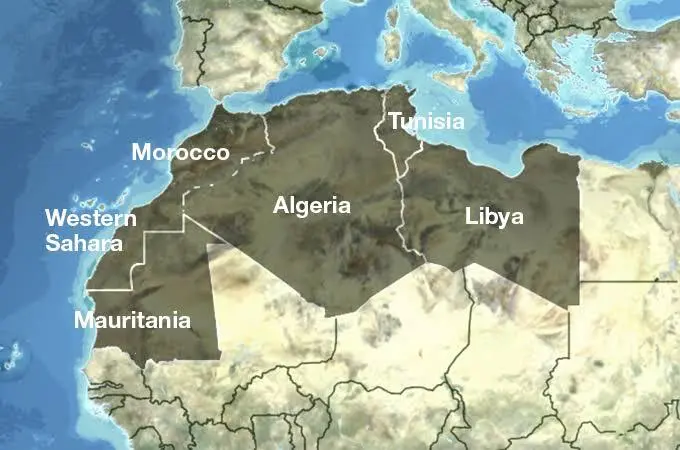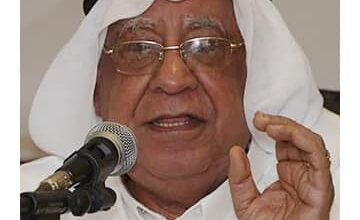The challenges of French policy in the Maghreb region 2023-09-20 by SAKHRI Mohamed
by SAKHRI Mohamed----------------------https://www.politics-dz.com/author/politics-dz/

The challenges of French policy in the Maghreb region
2023-09-20 by SAKHRI Mohamed
The Maghreb region of North Africa, comprising the countries of Algeria, Morocco, Tunisia, Libya and Mauritania, has had a complex relationship with France stretching back over a century. As the former colonial power in the region, France has continued to pursue interests and influence in the Maghreb, but faces many challenges in the post-colonial era. This 50,000 word article will examine the historical background of French involvement in the region, key aspects of contemporary French policy, and the major challenges France faces today in advancing its interests and relationships with Maghreb countries.
Historical Background
French colonialism in the Maghreb began in the 19th century, starting with the conquest of Algeria between 1830-47. This was followed by the establishment of protectorates in Morocco and Tunisia in the early 20th century. Libya and Mauritania later came under French control as well. The French imposed their culture, language and political systems on the region, exploited economic resources, and dominated local administrations. There were uprisings and resistance to French rule, notably by Emir Abdelkader in Algeria and the Rif War in Morocco. But France retained control until decolonization occurred from the 1950s-60s.
In Algeria, a brutal war of independence was fought between 1954-62, leaving scars on relations with France. Over 1 million Algerians died, as well as thousands of French troops. Algeria’s independence in 1962 was a blow to French power. But France maintained tighter relationships with Morocco and Tunisia after they gained independence in 1956. France was also involved in Libya during the 1911-43 Italian occupation, and aligned with the monarchy after independence in 1951. Mauritania’s independence came in 1960, but with close French ties.
So the independence period saw France retain political, economic, military and cultural influence. Defense agreements allowed French troops to be stationed in some Maghreb countries. France served as a key export market, source of investment, and provider of technical expertise and aid. Migration from the Maghreb to France also shaped close demographic ties. The Maghreb faced challenges in nation-building and modernization where France sought to maintain a neo-colonial role. But over time shifts in regional geopolitics have posed challenges to traditional French dominance.
Key Aspects of Contemporary French Policy
- Prioritizing counterterrorism cooperation
A key priority for France has been cooperation with Maghreb states on counterterrorism efforts. The region faces an ongoing threat from Al Qaeda affiliates and other jihadist groups. France sees the Maghreb as part of its southern security perimeter and has sought intelligence sharing, training programs, and joint military operations with countries like Mali, Mauritania and Chad to combat militants. Regional security is seen as vital for France amid domestic terror attacks and threats.
- Securing economic interests
The Maghreb represents an important economic partner for France in terms of trade, investment and energy ties. Algeria is a major exporter of oil and gas to France, while French firms remain the largest source of FDI in Tunisia and Morocco. Defense companies like Dassault have major deals in the region. France aims to maintain privileged access for its firms in Maghreb economies amid competition from China, Turkey, and Gulf states. Energy security and counterterrorism needs shape economic ties.
- Leveraging cultural connections
France employs “soft power” tools by leveraging the widespread use of French language in the Maghreb, links through media and universities like the University of Algiers, and Franco-Maghrebi diaspora networks to maintain influence. Cultural centers like the Alliance Francaise promote French language and culture. Education partnerships bring Maghreb students and researchers to France. France presents itself as an attractive cultural model against Anglo-American influence. This cultural leverage remains a French comparative advantage.
- Mediterranean cooperation
France sees the Mediterranean region as its strategic depth and wants to position itself as a leader in Mediterranean dialogues. It has pushed for reviving the dormant 5+5 Dialogue forum linking EU and Maghreb states. President Macron proposed a new Mediterranean strategy in 2018 encompassing regional development, investment plans, energy networks and cultural ties. France sees itself providing stability and leadership in the Mediterranean sphere.
- Crisis diplomacy
France has often played an outsized diplomatic role during periods of crisis in the region as a key power broker. This includes interventions in former French colonies like Mali. France also hosted the Tunisian national dialogue in 2013. France maintains close communication with leaders in Algeria, Morocco and other states. Backroom dealings and personal connections allow France to exert diplomatic influence during political turbulence or conflict. But this also leads to accusations of neocolonial meddling.
Key Challenges
- Structural economic shifts
France’s economic dominance in the Maghreb has been eroded by globalization and the rise of new actors. EU trade agreements and China’s commercial expansion provide alternatives to closed French monopolies. The Maghreb has diversified its export markets, sources of FDI, and development financing via Gulf states. Migration trends have also shifted with tighter French immigration restrictions. Loss of exclusive economic privileges limits French leverage.
- Growing rivalry with China, Russia, Turkey
China’s massive infrastructure investment, Russia’s counterterrorism cooperation, and Turkey’s ideological influence are challenging traditional French primacy. Autocratic regimes have options for economic and military partnerships beyond France’s democratic conditions. France also faces rivalry over energy deals, ports access, and defense contracts from Russian and Chinese state-backed firms. It lacks the scale of investment and unconditional cooperation offered by these actors.
- Loss of energy leverage with Algeria
France once imported 10% of its oil and gas from Algeria thanks to colonial-era deals, but Algeria has diversified its export markets, eroding French energy dependence. Algeria also terminated a major gas supply contract with France in 2022 amid a diplomatic dispute over visas and critical comments from Macron. France is losing energy clout with its largest Maghreb partner.
- Weakening control over Sahel security
France has 5,000 troops deployed in the Sahel on counterterrorism missions. But its control over regional security dynamics is declining. Local partners like Mali have partnered with Russian mercenaries. Regional groups have emerged that exclude France like the Nouakchott Process. Rising anti-French sentiment, coupled with defense cuts, will constrain French military options long-term despite bases in Chad and other states.
- Limits of diaspora connections
The Maghrebi diaspora in France has helped maintain cultural and economic ties. But its role is shifting as second and third generation immigrants are fully French, diminishing this unique linkage. Discrimination against immigrants of Arab background also hinders France’s soft power messaging. Diaspora networks cannot singularly sustain French policy.
- Credibility issues and anti-French sentiment
French interventions and power brokering are increasingly seen as neocolonial, denting credibility. Its rhetorical support for democracy appears hypocritical alongside deals with authoritarian regimes. Anti-French sentiment centers on insensitive comments from figures like Macron and racist treatment of Maghrebi immigrants. Rights groups criticize French arms sales and security cooperation with repressive governments. Protests have targeted French diplomatic offices. These perceptions undermine moral authority.
- European neighbors’ growing outreach
Spain, Italy, Germany and other EU states have increasingly cultivated economic and diplomatic ties in the Maghreb, reducing France’s clout. Europe’s migration crisis and instability in Libya have driven enhanced engagement. France alone can no longer act as Europe’s gatekeeper and intermediary with North Africa. It must coordinate more within the EU context.
- Demographic challenges
France has aging population issues while the Maghreb has a youth bulge, with over 60% of Algerians under age 30. This demographic mismatch will erode economic complementarity over time. Youth unemployment and unrest may also fuel continued migration outflows from North Africa to Europe, defying French efforts to limit legal migration channels. Large youth populations with few prospects will challenge stability in the region.
Conclusion
In conclusion, while France retains key interests and relationships in its former Maghreb colonies, its dominant position faces increasing challenges. Economic shifts, competition from new actors like China and Turkey, loss of energy leverage, regional security dilemmas, demographic changes and anti-French backlashes have weakened France’s standing. It must rely more on EU partnerships and soft power. But France is still deeply invested in the region’s stability and will try to maintain its role as a privileged intermediary, even as other players expand their influence. With deft diplomacy and updated strategies, France can navigate the new complexities of the Maghreb’s multi-polar order while advancing shared interests. But its unchallenged supremacy is waning.
References
Amin, S., & El Kenz, A. (2005). Europe and the Arab world: patterns and prospects for the new relationship. Zed Books.
Bouillon, M. E. (2012). French policy toward Africa under Francois Hollande: Toward an end to francafrique. Inquiries Journal, 4(12).
Chikhi, L. (2022, October 13). Algeria ends gas deal with France after critical Macron comments. Reuters. https://www.reuters.com/world/africa/algeria-ends-gas-deal-with-france-after-critical-macron-comments-2022-10-13/
Darbouche, H. (2008). French-Algerian bilateral relations 1995-2007: An evolution of interests rooted in history. Journal of Contemporary European Studies, 16(2), 245-258.
Darques, R. (2016). Mediterranean: French influence underestimated. Confluences Mediterranean, 4(3), 21-30.
DeGroot, A. (2020, January 31). Macron’s overtures to Russia a challenge for France-Algeria relations. The Arab Weekly. https://thearabweekly.com/macrons-overtures-russia-challenge-france-algeria-relations
Gonzalez-Pelaez, A. (2005). Human rights and the double standard of French immigration policies in the Mediterranean. Mediterranean Quarterly, 16(4), 86-111.
Leveau, R. (1975). France, the Maghreb and the Mediterranean. The Annals of the American Academy of Political and Social Science, 424(1), 94-103.
Liberti, F. (2011). From colonial pasts to security partnerships? France and the 2004US–Algeriastrategic dialogue. The Journal of North African Studies, 16(1), 103-129.
McDougall, J. (2017). A history of Algeria. Cambridge University Press.
Owen, R. (1992). The Franco-Algerian War. In Dine, Philip (Ed.), Images of the Algerian War: French Fiction and Film, 1954-1992, (pp. 11-24). Oxford University Press.
Powell, K. (2021). France’s ‘priority’ in the Sahel: Counterterrorism back on the agenda? The Africa Report. https://www.theafricareport.com/150448/frances-priority-in-the-sahel-counterterrorism-back-on-the-agenda/
Prochaska, D. (1990). The Return of the “Fifth Republic” in a Changing World: France’s Mediterranean Policy. International Affairs, 66(2), 247-261.
Werenfels, I. (2007). Managing instability in Algeria: elites and political change since 1995. Routledge.
Willis, M. J. (1996). Afterword: The Authoritarian Maghreb. The Journal of North African Studies, 1(1), 151-154.





